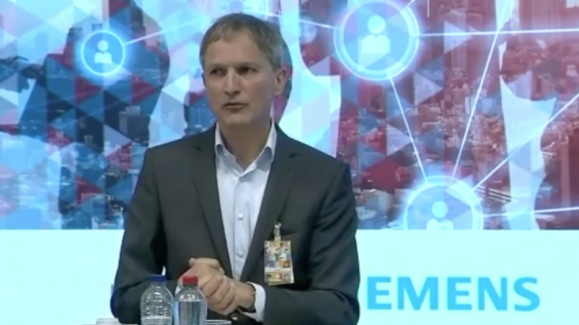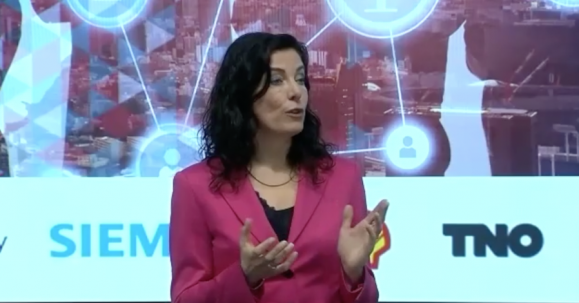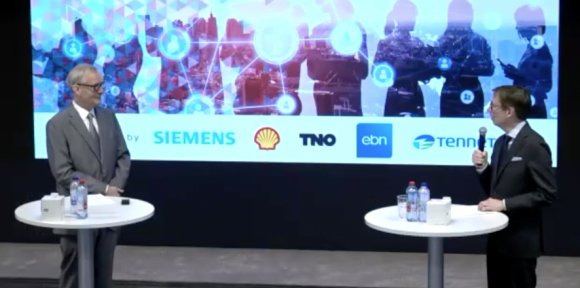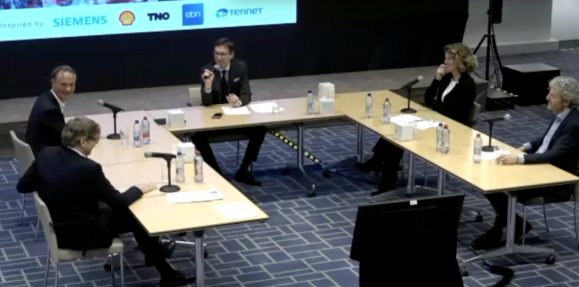
REPORT: THE DUTCH ENERGY LAW
Beyond borders is the 2021 theme of our Energy Reinvented Community and indeed this year looks beyond borders: 1,250 members, TenneT as our new partner, more diversity in our Board – and off course COVID 19 still forcing to further develop new ways of meeting and conferencing.
We started with four working group sessions one after the other, allowing members to attend all four of them instead of just one. Presentations of these sessions are available in the member section of our website(FORUM).
The first 2021 ERC event looked beyond the borders of the new Dutch Energy Law: the key questions were raised right at the start of the event by the hosts Adam Middleton (Siemens Energy) and Hugo Buis (Shell). Is the new Energy Law fit for purpose to make progress in the Energy Transition? Will the Law speed up the energy transition? Are we as companies doing enough?
Big questions for the respective speakers and panel members, but also for us as some 250 members’ audience. Remco de Boer introduced our three plenary speakers, Sandor Gaastra DG at the Ministry of Economic Affairs and Climate, Saskia Lavrijssen professor at the Tilburg Law School and Max Oosterhuis, partner at Loyens & Loeff.
Sandor presented the importance of the new law, but he also demonstrated the complexity of related EU regulation with new policy goals such as Low Carbon and Embedded. The environment and spatial planning for the Energy Transition (e.g. wind and solar farms) are new and beyond current borders. And on top of Pillar II deals with Big Data as necessity and promising resource – balancing with Pillar V Protection of Consumers.

Saskia looked through the lenses of Energy Justice and Energy Democracy and concluded the Energy Law to be rule-based rather than principle based, thereby potentially hampering innovations in the market. And she made a strong comment regarding the independence of the Regulator versus the (political) delegations to the Ministry.

Are you a Prosumer already? Many Dutch households, energy cooperatives and small businesses are electricity prosumers nowadays with solar panels, a wind turbine and a smart meter. Max took us in the world of Prosumers under the new Energy Law. Potentially there will be millions of prosumers and my takeaway is that installing solar panels on the rooftop will hold more future opportunities and complexities for the prosumer. Choosing your own off-taker or aggregator – a new market party – and even becoming your own Balance Responsibility Party if you want.

Remco asked the plenary speakers to comment on bringing the Energy Transition forward with this law and continued this in the panel. A lively discussion with Medy van der Laan chair Energie-Nederland, Dick Weiffenbach, managing director Netbeheer Nederland, Hans Grünfeld managing director at VEMW, and Olaf van der Gaag director at NVDE acknowledged the required complexity of the Energy Law but at the same time ‘it could have been better’. Heat is not included although alternative heat sources will replace natural gas. Hydrogen is hardly placed in the law. Therefore, System Integration is not very well positioned for the future.

For all parties involved, the Energy Transition itself and all the likes and dislikes that were raised by the speakers and the audience, one expression brought it all together for me: the new Energy Law should not become a new Lawyers’ Paradise!
All presentations as well as the videos of the day can be found at the website by using your personal login code.
Go to FORUM, select EVENTS and select 2021-04 "BEYOND BORDERS - THE DUTCH ENERGY LAW".
Looking forward to meeting you again on our next event on 8 June 2021, BEYOND BORDERS - BRINGING OFFSHORE A SHORE.
Kind regards,
Rene Peters | Martine Hoeksma | Barthold Schroot | Koenraad van Hasselt | Jan Prins





